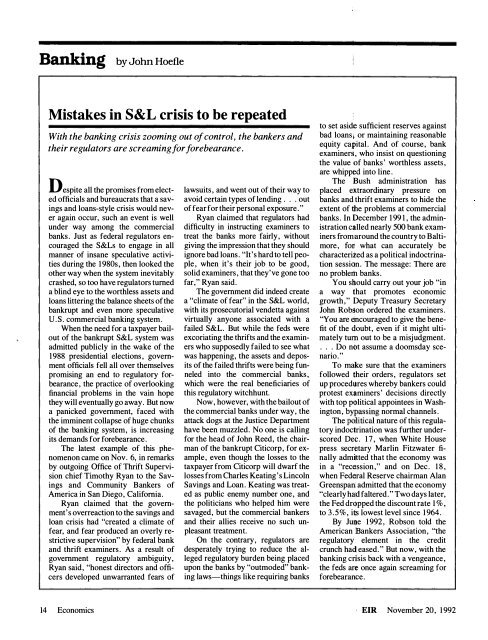Executive Intelligence Review, Volume 19, Number 46, November ...
Executive Intelligence Review, Volume 19, Number 46, November ...
Executive Intelligence Review, Volume 19, Number 46, November ...
You also want an ePaper? Increase the reach of your titles
YUMPU automatically turns print PDFs into web optimized ePapers that Google loves.
Banking by John Hoefle<br />
Mistakes in S&L crisis to be repeated<br />
With the banking crisis zooming out of control, the bankers and<br />
their regulators are screaming for forebearance.<br />
DesPite all the promises from elected<br />
officials and bureaucrats that a savings<br />
and loans-style crisis would never<br />
again occur, such an event is well<br />
under way among the commercial<br />
banks. Just as federal regulators encouraged<br />
the S&Ls to engage in all<br />
manner of insane speculative activities<br />
during the <strong>19</strong>80s, then looked the<br />
other way when the system inevitably<br />
crashed, so too have regulators turned<br />
a blind eye to the worthless assets and<br />
loans littering the balance sheets of the<br />
bankrupt and even more speculative<br />
U.S. commercial banking system.<br />
When the need for a taxpayer bailout<br />
of the bankrupt S&L system was<br />
admitted publicly in the wake of the<br />
<strong>19</strong>88 presidential elections, government<br />
officials fell all over themselves<br />
promising an end to regulatory forbearance,<br />
the practice of overlooking<br />
financial problems in the vain hope<br />
they will eventually go away. But now<br />
a panicked government, faced with<br />
the imminent collapse of huge chunks<br />
of the banking system, is increasing<br />
its demands for forebearance.<br />
The latest example of this phenomenon<br />
came on Nov. 6, in remarks<br />
by outgoing Office of Thrift Supervision<br />
chief Timothy Ryan to the Savings<br />
and Community Bankers of<br />
America in San Diego, California.<br />
Ryan claimed that the government's<br />
overreaction to the savings and<br />
loan crisis had "created a climate of<br />
fear, and fear produced an overly restrictive<br />
supervision" by federal bank<br />
and thrift examiners. As a result of<br />
government regulatory ambiguity,<br />
Ryan said, "honest directors and officers<br />
developed unwarranted fears of<br />
14 Economics<br />
lawsuits, and went out of their way to<br />
avoid certain types of lending . . . out<br />
of fear for their personal exposure."<br />
Ryan claimed that regulators had<br />
difficulty in instructing examiners to<br />
treat the banks more fairly, without<br />
giving the impression that they should<br />
ignore bad loans. "It's hard to tell people,<br />
when it's their job to be good,<br />
solid examiners, that they've gone too<br />
far," Ryan said.<br />
The government did indeed create<br />
a "climate of fear" in the S&L world,<br />
with its prosecutorial vendetta against<br />
virtually anyone associated with a<br />
failed S&L. But while the feds were<br />
excoriating the thrifts and the examiners<br />
who supposedly failed to see what<br />
was happening, the assets and deposits<br />
of the failed thrifts were being funneled<br />
into the commercial banks,<br />
which were the real beneficiaries of<br />
this regulatory witchhunt.<br />
Now, however, with the bailout of<br />
the commercial banks under way, the<br />
attack dogs at the Justice Department<br />
have been muzzled. No one is calling<br />
for the head of John Reed, the chairman<br />
of the bankrupt Citicorp, for example,<br />
even though the losses to the<br />
taxpayer from Citicorp will dwarf the<br />
losses from Charles Keating's Lincoln<br />
Savings and Loan. Keating was treated<br />
as public enemy number one, and<br />
the politicians who helped him were<br />
savaged, but the commercial bankers<br />
and their allies receive no such unpleasant<br />
treatment.<br />
On the contrary, regulators are<br />
desperately trying to reduce the alleged<br />
regulatory burden being placed<br />
upon the banks by "outmoded" banking<br />
laws-things like requiring banks<br />
to set aside sufficient reserves against<br />
bad loansi or maintaining reasonable<br />
equity capital. And of course, bank<br />
examiners, who insist on questioning<br />
the value of banks' worthless assets,<br />
are whipped into line .<br />
The Bush administration has<br />
placed extraordinary pressure on<br />
banks and, thrift examiners to hide the<br />
extent of the problems at commercial<br />
banks. In December <strong>19</strong>91, the administration<br />
called nearly 500 bank examiners<br />
fromlaround the country to Baltimore,<br />
fOlt what can accurately be<br />
characterited as a political indoctrination<br />
session. The message: There are<br />
no problem banks.<br />
You should carry out your job "in<br />
a way that promotes economic<br />
growth," Deputy Treasury Secretary<br />
John Rob�on ordered the examiners.<br />
"You are �couraged to give the benefit<br />
of the doubt, even if it might ultimately<br />
tum out to be a misjudgment.<br />
. . . Do n�t assume a doomsday scenario."<br />
To make sure that the examiners<br />
followed their orders, regulators set<br />
up procedures whereby bankers could<br />
protest examiners' decisions directly<br />
with top pOlitical appointees in Washington,<br />
bY1?assing normal channels.<br />
The pOlitical nature of this regulatory<br />
indoctrination was further underscored<br />
Dec. 17, when White House<br />
press secretary Marlin Fitzwater finally<br />
admitted that the economy was<br />
in a "recession," and on Dec. 18,<br />
when Federal Reserve chairman Alan<br />
Greenspani admitted that the economy<br />
"clearly had faltered." Two days later,<br />
the Fed dropped the discount rate 1 %,<br />
to 3.5%, iti; lowest level since <strong>19</strong>64.<br />
By June <strong>19</strong>92, Robson told the<br />
American iBankers Association, "the<br />
regulatory · element in the credit<br />
crunch had eased." But now, with the<br />
banking crisis back with a vengeance,<br />
the feds are once again screaming for<br />
forebearance.<br />
' EIR <strong>November</strong> 20, <strong>19</strong>92

















